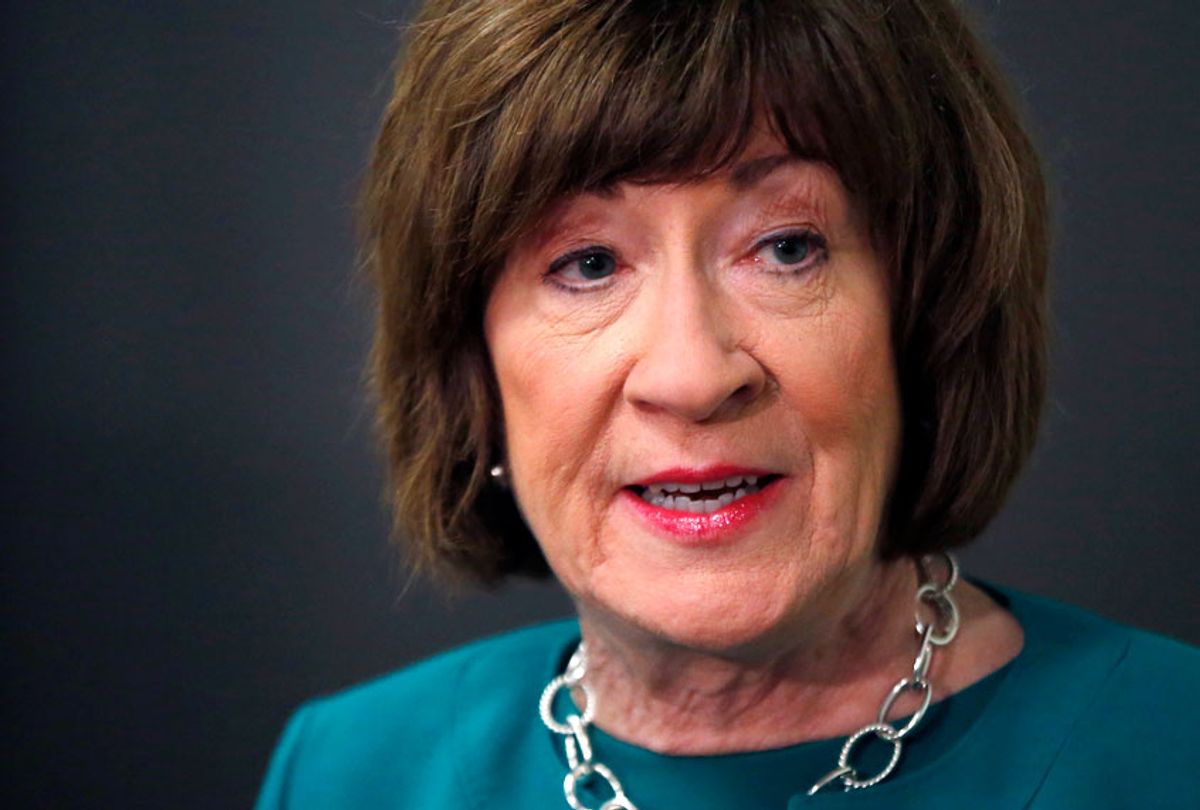Sen. Susan Collins of Maine was among the three GOP senators who, in 2017, voted against the American Health Care Act, the Republican-sponsored bill that would have repealed the Affordable Care Act of 2010, also known as Obamacare—and, according to the analysis of the Congressional Budget Office, left millions of Americans without health insurance. But even though the American Health Care Act was narrowly defeated in the Senate, President Donald Trump has not given up on abolishing Obamacare. Trump, this week, has been championing the GOP-sponsored lawsuit Texas v. Azar, which asserts that Obamacare needs to be struck down as unconstitutional. And even though the 66-year-old Collins has expressed her opposition to the lawsuit, she will bear some of the blame if it is ultimately successful and the ACA is overturned.
Should Texas v. Azar make its way to the U.S. Supreme Court, it is entirely possible that two of the Trump-appointed justices that Collins voted in favor of—Neil Gorsuch in 2017 and Brett Kavanaugh in 2018—will agree with the lawsuit’s premise and vote to strike down the ACA as unconstitutional. According to a new Urban Institute study, ending the ACA without a replacement would cause a staggering 20 million people to lose their health insurance in the United States. And politically, that’s bad news for Collins, who is up for reelection in 2020. If they lose their health insurance thanks, in part, to Kavanaugh and Gorsuch, Maine residents will not forget that Collins helped put them on the Supreme Court.
Here are three possible scenarios in 2020, all of them negative for the Maine senator.
1. Collins might decide not to seek reelection
In Maine, anti-Kavanaugh activists have been crowdfunding a hypothetical Democratic candidate to run against Collins in 2020—that’s how angry they are with her for voting to confirm Trump’s second Supreme Court appointee. As of March 28, 2019, the activists have raised $3,776,803 for the hypothetical Democrat (whoever it turns out to be). But Collins might decide against seeking another term, which would make sense in light of the fact that she is under fire from angry Democrats on one hand and far-right Trump supporters on the other. Collins might conclude that running for reelection in 2020 is more trouble than it’s worth.
The senator has indicated that she plans to seek a fifth term, although she hasn’t announced a final decision.
2. Collins could face a far-right GOP primary challenge
Collins has a very conservative voting record and has supported Trump more often than not. Although she joined two other Republican senators, Alaska’s Lisa Murkowski and the late John McCain of Arizona, in voting against the American Health Care Act of 2017, Collins voted to confirm both of Trump’s Supreme Court nominees and voted for the GOP-sponsored Tax Cuts and Jobs Act of 2017 (which greatly reduced corporate tax rates but offered precious little tax relief for the American middle class). But to many far-right Trump supporters and Tea Party extremists, Collins is still a RINO: a Republican In Name Only. And the wingnuts who resent her for being pro-choice on abortion, voting against Obamacare repeal and opposing Trump’s emergency declaration for the U.S./Mexico border might vote her out of office via a 2020 Republican primary.
In fact, pro-Trump blogger Derek Levasseur has already announced that he plans to challenge Collins in a GOP primary in Maine next year. To Levasseur and other Trumpistas, being pro-Trump 80%, 85% or 90% of the time is not good enough: nothing short of 100% obedience to The Donald will suffice.
3. Collins could lose in the general election
Assuming that Collins seeks reelection, defeats Levasseur in a Republican primary and makes it to the general election, she will face another hurdle: trying to defeat a Democratic nominee—and after her pro-Kavanaugh vote, Maine Democrats will be anxious to remove her from the Senate. Maine is a blue state: President Barack Obama carried Maine in 2008 and 2012, and Hillary Clinton carried the state in 2016.
By moving so far to the right, the modern-day GOP has put someone like Collins—a conservative who isn’t a total extremist—in a difficult position in blue states. On one hand, Republicans face the unending threat of a primary challenge from Trumpistas and Tea Party ideologues if they’re considered too moderate. But on the other hand, being forced to jump through hoops to show how right-wing they are becomes a liability in general elections if a state leans Democrat.
If Collins is no longer in the U.S. Senate in 2021, Republicans will have only themselves to blame.




Shares